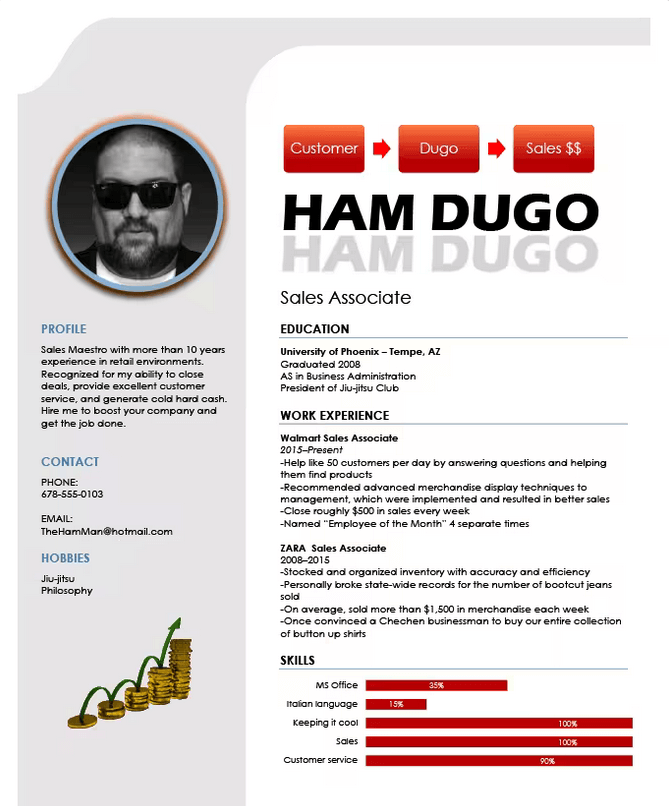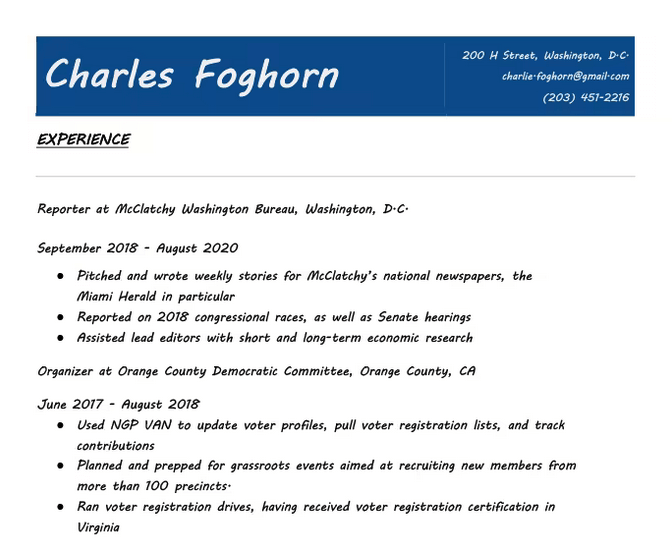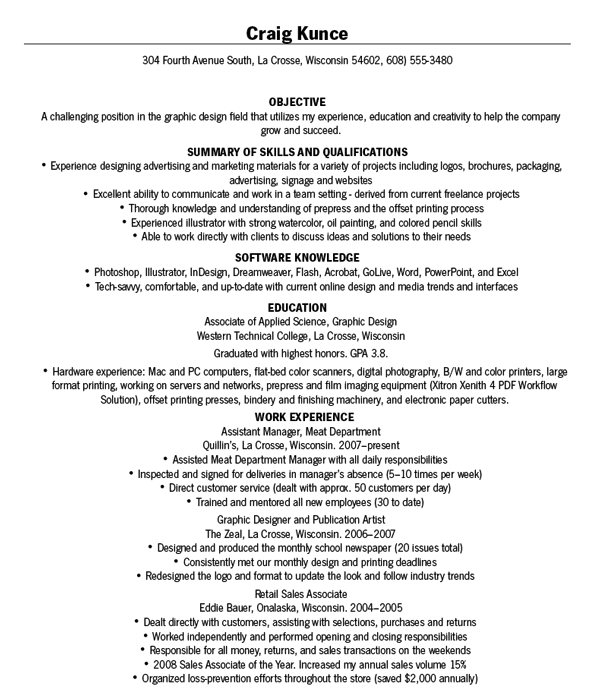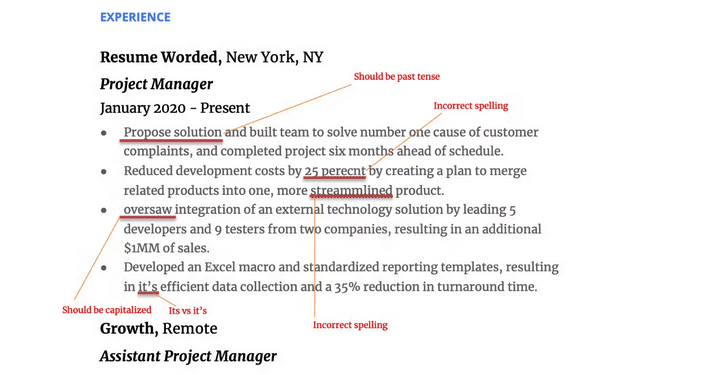Bad Resume Examples: 10 Resume Mistakes to Avoid
Avoid these mistakes to write an interview-worthy resume
I’ve seen enough bad resume examples to know that most of them don’t fail because the person lacks skills. Instead they fail because simple mistakes get in the way. If you’ve ever wondered whether your resume has hidden red flags, you’re not alone. In this article, we’ll walk through real problems people often overlook, why they matter, and how you can fix them before they cost you an opportunity.
Your resume only has a few seconds to impress hiring managers. Thus, it is important not only to include your most prominent achievements and skills but also to avoid mistakes that can get your resume tossed in no time.
Our team came across some really bad resumes. The most common resume mistakes feature poor writing, unprofessional design, irrelevant information, and lack of focus. Take a look at these bad resumes below to avoid mistakes when writing your own.
Want a professional resume that will get you noticed? Work with our expert. At ResumePerk, we prepare resumes and cover letters for every industry. A professional resume writer will improve and polish your document, removing any mistakes that can cost you an interview. Moreover, we will focus on your key selling points to present you as a perfectly qualified candidate.
Bad resume example #1 - Unprofessional graphic design

Avoid amateur graphics on your resume. Image: Resume Genius
People often hear that bright, catchy design is important to impress the hiring manager. This resume surely pops up, but not in a good way. It features plenty of graphic elements that distract from resume content, and look unprofessional. The tone doesn't look professional either - "hire me to get the job done" isn't the best phrase to use on a resume. Besides, this resume has a picture, which is not recommended if you are looking for a job in the US.
Why are graphics a bad idea? First and foremost, 98% of Fortune 500 companies and the majority of smaller ones use applicant tracking systems, or ATS. This software sorts out irrelevant resumes, and it often fails to process images and graphics. Thus, a content-heavy resume has every chance of getting tossed.
How to fix it? A good resume should use plain, professional formatting. You may use color, but do it sparingly to highlight key information. Remove your photo and any flashy graphics that do not add value and replace them with specific skills and accomplishments.
Bad resume example #2 - Fancy fonts

Unprofessional fonts are a huge turnoff. Image: Resume Genius
This resume has a great professional experience section, but the font ruins it all. Firstly, handwritten fonts look unprofessional and show that you probably lack communication skills for the job position. Secondly, they are hard to read. Hiring managers are pressed for time, and are likely to toss such a resume. Finally, a fancy font might not open on the other computer, and your application will go nowhere without being read.
Why are fonts important? Popular fonts such as Calibri or Arial open on most computers and other devices, and don't distract the reader from your resume's content.
How to fix it? When writing your own resume, use a common font from the list below. Remember to keep your font big enough for readability - 10-12pts is best. Use the same font throughout the resume to make a neat, professional impression on the reader.
Good resume fonts:
- Calibri
- Helvetica
- Arial
- Cambria
- Garamond
- Georgia
- Times New Roman
Bad resume example #3 - Vague work experience

Generic job descriptions will not impress the hiring manager. Image: Novoresume
Like the above bad resume examples, this resume will hardly land an interview. Your professional experience is the most important section, and it should showcase the potential employers your key successes and potential. This example of a job description lacks specifics and sounds uninspired. Moreover, it makes the recruiters assume that you had poor performance with no achievements, and therefore you won't be a good hire.
Why are achievements important? Specific job duties and achievements show that you are proactive about your career and willing to deliver results for the company. Moreover, achievements help you pop up from other candidates, increasing your chance of landing a dream job.
How to fix it? For each job title, include a specific job description with numbers and percentages where possible. For example, instead of Lead Generation, you can write Developed a lead generation strategy for a B2B telecommunication company, resulting in a 23% sales increase.
Keep each job description informative and concise. 5-7 bullet points per role are usually enough to introduce your professional qualifications and achievements. Thus, you will make your experience instantly impressive, setting yourself apart from other job-seekers.
Bad resume example #4 - Poor formatting

Unprofessional formatting can cost you interviews. Image: Craig Kunce
Like the above bad resume examples, this one is likely to turn off recruiters. The reason is simple: unprofessional formatting that is difficult to read. Remember that hiring managers are pressed for time, and when they receive a document with poor formatting, unprofessional design, or other issues, they are likely to toss it. Other common mistakes in this example include the wrong order of sections (professional history should go above education) and using an objective statement.
Why does formatting matter? In the hiring process, recruiters scan each resume rather than read it from top to bottom. If the document is cluttered or poorly formatted and they cannot locate the needed info about your work history, education, or achievements, they'll probably ditch your application.
How to fix it? Left-align the resume text and boldface the important information (such as job titles and company names). Use a bigger font for section headings to ease the reading. Balance the use of white space on the page to make the document visually appealing. Neat, professional formatting will help you achieve better results in your job search.
Bad resume example #5 - Grammar and spelling mistakes

Avoid typos and poor grammar at all costs. Image: Resume Worded
According to the stats, 59% of recruiters will reject a resume with grammatical and spelling mistakes. This poor resume example has plenty of them. Such mistakes show sloppiness and a lack of attention to detail, both of which aren't desirable qualifications for recruiters. Or, the employer might see spelling and grammar mistakes as a lack of interest in the position if you didn't bother to proofread the document before submitting it to a company.
Why are writing skills important? Error-free writing and a professional tone communicate a lot of important traits to employers. It shows that you can effectively communicate in writing, are attentive to detail, and have a strong work ethic. Advanced writing skills are especially important for positions in marketing, sales, client service, communications, and social media management.
How to fix it? Correct any grammatical and spelling mistakes before sending. You may use a spell checker to quickly spot minor mistakes, but keep in mind that there are errors that online checkers cannot detect. So, take the time to proofread the resume summary to avoid any grammar errors.
If you want to be confident in your resume, contact us for resume editing. An experienced editor will ensure that your resume has the critical information, and correct any writing mistakes. Moreover, we will add a catchy resume summary, keywords, and update the layout to ensure a professional impression.
Other resume mistakes to avoid
In addition to removing unprofessional graphics and correcting spelling and grammar mistakes, eliminate other popular mistakes that can cost you interviews:
Making it too many pages
According to most employers, a one- or two-page resume is the industry standard. One page is perfect for fresh graduates and career switchers, while two-page resume templates are best for experienced professionals.
Try not to exceed that length. Of course, it is not prohibited to submit more than two pages, but recruiters rarely have time to read long resumes. Try to keep it short and up to the point. List your jobs and degrees in reverse chronological order so that the employer can quickly locate the information they need.
Including irrelevant information
Since resume space is limited, include only relevant experience in it. If you have 7+ years of experience in marketing and launching social media campaigns, remove your student job as a bartender. Cut off the skills you no longer use or online courses irrelevant to your area of work. Senior job-seekers can remove their graduation year and any jobs they had over 15 years ago to avoid discrimination.
Avoid any personal information such as your age, gender, marital status, or ethnicity. Not only this is irrelevant, but also employers might reject such resumes to avoid problems with anti-discrimination laws.
Not using a Skills list
Good resume examples often feature a dedicated Skills section. It is helpful for two reasons. Firstly, it puts your key hard and soft skills in front of the hiring manager's eyes and makes your resume skimmable. Secondly, it is good for ATS optimization as you can use skills as keywords.
Add the Skills section after your career summary, or at the bottom following the work experience section. Use 8-16 skills, including your professional competencies, software proficiency, foreign languages, and soft skills.
Using the Objective instead of a Summary
Using the resume objective is considered out of date. A one-sentence objective adds no value to your resume as it only focuses on what you expect to get from the employer. On the contrary, the Summary focuses on what you can bring to the table and what distinguishes you as a job-seeker.
So, it is best to use a short Summary section. Add your target job title, and how many years of experience you have, and add 2-3 skills/accomplishments. Your goal is to encourage the recruiter to read your resume from top to bottom. Make it 2-3 sentences - it is enough to grab attention and quickly introduce yourself.
Unexplained career gaps
Even if your resume has no spelling errors and is properly aligned with bullet points, it can turn off the employer if you have employment gaps. A two month gap is no big deal; yet, if you've been unemployed for six months or a year, this will raise questions. The problem is that hiring managers see gaps as indicators of poor performance or a lack of commitment.
Explain what you did during that gap in employment. You can add a few lines to your resume, or address the issue in your cover letter. Say, if you took a year off to raise your child, you may add experience as a stay-at-home dad or mom, and include any courses or part-time jobs you had during that time.
Not tailoring it to a job position
In 2024, generic resumes don't bring results. They get tossed by applicant tracking software, and even if the hiring manager sees them, they'll quickly spot that the resume is not personalized.
It is important to adjust your resume for each employer a bit to explain how your experience will benefit each particular company. It will show your interest in the company and prove that you have what it takes to thrive in the role.
No need to rewrite your resume for each job. Adjusting your summary, skills, and the most recent role is often enough. Say, if the job posting asks for experience in generated leads, explain what channels you used for lead generation and what results you achieved for the business.
Not attaching a cover letter
Today, 60% of employers demand a cover letter with your resume. Besides, a cover letter is your chance to show motivation to join a specific company, emphasize your cultural fit, and explain any issues such as career gaps.
Like your resume, a good cover letter should have at least 2-3 achievements relevant to the target job. Keep the letter concise and focused on the position you have in mind.
Bad resume examples show what not to do when preparing your resume. To avoid making a wrong impression, restrain yourself from using unnecessary graphics, fun fonts, and other unprofessional content. Make sure that your document is informative, professional-looking, and focused on what the employer looks for in candidate. Such an approach will land you more interviews!
Impress hiring managers with a professional resume
Not getting enough interviews with your resume? Our experts can help improve and polish your document. A skilled resume editor will fix grammar mistakes, poor formatting and other issues that hold back your resume. We work on the writing style, structure, layout, and content to ensure a perfect professional impression. Try our services today with a 15% discount!
Author: Editorial Team at ResumePerk.com
Reviewed by: Certified Career Expert
Last updated: December 2025
Recommended reading:


